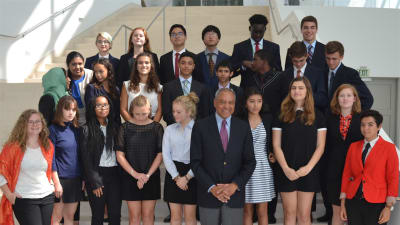Fall 2015 confronts the Rwandan Genocide
“Never again,” is an oft-quoted post-Holocaust imperative. In 1948 the United Nations overwhelmingly passed the Genocide Convention, which stated that “genocide…is a crime …which [we] undertake to prevent and to punish.” But how do we prevent and punish genocide? Most observers say the world is still uncertain. And there is no better example of this uncertainty than the subject of this week’s case study: the 1994 Rwandan genocide.
Our exploration began on Monday evening with a viewing of the PBS Frontline documentary Ghosts of Rwanda. The late-night viewing is an SEGL tradition–it marks the end of the first week’s “settling in” and the beginning of the difficult leadership work that is an SEGL semester. The film documents the 1994 Rwandan genocide and the world’s response (or lack of a response), and examines many of the ethical choices made during the conflict. The discussion that followed was intense, emotive, and forward-looking, and continued long after the official end of the conversation.
Three of the leaders featured in the documentary are longtime SEGL guest speakers, and we met with two of them this week.
First up was Carl Wilkens, a former Adventist missionary who was the head of his church’s relief mission in Rwanda during the genocide. He was the only American to stay behind in 1994, and is most well-known for (among other acts) saving an entire orphanage from Interahamwe machetes. To SEGL graduates, he is a winner of our coveted “Golden Mug” award, which our graduates give to the speaker who has made the biggest difference in their lives.
Wilkens is the founder of World Outside My Shoes, a genocide prevention NGO that speaks with students and educators around the world. The students asked him a wide range of questions–some personal, some political–and listened intently as he carefully and thoroughly addressed each one. Many later said it was the highlight of their SEGL journey so far.
(Carl was an honorary SEGL teacher last summer when we visited Rwanda with him. To learn more about the trip, visit our SEGL in Rwanda page.)
On Wednesday we traveled to the U.S Holocaust Memorial Museum for a special tour before the museum opened. (Thanks to SEGL board member Jesse Nickelson, who is Director of Youth and Community Engagement at USHMM, for this opportunity!) With two Holocaust survivors as guides, we made our way through the main exhibition quietly and intently. The experience allowed us to investigate the roots of the 20th century’s most notorious genocide: what small steps led to such a huge tragedy?
After a Foggy Bottom neighborhood lunch outing we traveled to the United States Institute of Peace, where we met with with USIP Board Vice Chair George Moose. Moose’s diplomatic career is storied, including serving as U.S Ambassador to several countries; we speak with him in part because he was Assistant U.S. Secretary of State for Africa during the genocide.
Before he spoke, we met with USIP’s Ann Louise Colgan, who heads the Institute’s Global Peacebuilding Center. She explained USIP’s educational mission, shared resources with students hoping to work against genocide, and promoted the International Day of Peace later this month. (SEGL graduate Allie Douma, who took advantage of USIP’s resources when creating her SEGL social venture project, is featured on the USIP website; click here for more.)
Then Moose took the spotlight. He answered questions from students about the U.S.’s (and his own) role in Rwanda, “lessons learned” from Rwanda, and preventing genocide in the future. As he spoke, the students recognized his distinctive style of speaking: Whereas Wilkens is an activist, Moose is an accomplished diplomat. Each position can create good in the world, and each position requires a different presentation style. Thinking about the limitations and power of each role, as well as the style needed to carry out each role effectively, will help our students craft their ideal career paths.
Later this semester, we will meet with Laura Lane, who organized the U.S. evacuation from Rwanda during the genocide (she is now a leading executive at UPS). And, in a first for SEGL, we will speak with Stephen Pomper, Senior Director for Multilateral Affairs and Human Rights at the White House National Security Council. He is also chair of the NSC’s Atrocities Prevention Board. In this capacity, he is the senior advisor to the President on genocide prevention.
After our trip to USIP, we made a quick transition to Books and Basketball, our weekly service experience with first and second graders at a low-income DC public school. More on that in an upcoming blog post!
This week, we also began an ongoing educational series on the refugee crisis in Europe and the Middle East that has dominated international news for the last two weeks. We began that series with a lunchtime teach-in from our Director, Noah Bopp. We’ve also scheduled several other opportunities to learn more and will mention those opportunities in a future post.
Next week, we confront the Israeli-Palestinian Conflict.












